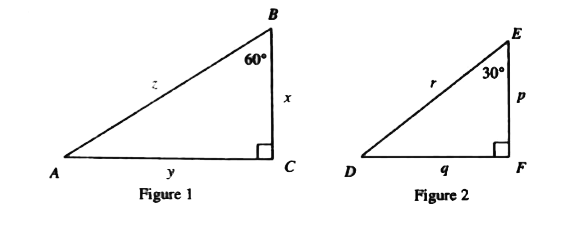Prove that x3p+x3q+1+x3r+2 is exactly divisible by x2+x+1, if p,q,r is integer.
m, n, k are rational
m, n, k are integers
m, n, k are positive integers only
None of these
The correct Answer is:B
To prove that x3p+x3q+1+x3r+2 is exactly divisible by x2+x+1 for integers p,q,r, we can follow these steps:
Step 1: Identify the Roots of the Polynomial
The polynomial x2+x+1 has roots which are the cube roots of unity, denoted as ω and ω2, where ω=e2πi/3. These roots satisfy the equations:
ω3=1and1+ω+ω2=0
Step 2: Substitute ω into the Expression
We will evaluate the expression x3p+x3q+1+x3r+2 at x=ω:
ω3p+ω3q+1+ω3r+2
Step 3: Simplify Each Term
Using the property ω3=1:
- ω3p=1
- ω3q+1=ω
- ω3r+2=ω2
Thus, we can rewrite the expression:
ω3p+ω3q+1+ω3r+2=1+ω+ω2
Step 4: Use the Property of Roots
From the property of cube roots of unity, we know:
1+ω+ω2=0
Therefore, substituting this back, we get:
ω3p+ω3q+1+ω3r+2=0
Step 5: Repeat for ω2
Now, we will evaluate the expression at x=ω2:
(ω2)3p+(ω2)3q+1+(ω2)3r+2
Using (ω2)3=1:
- (ω2)3p=1
- (ω2)3q+1=ω2
- (ω2)3r+2=ω
Thus, we can rewrite the expression:
(ω2)3p+(ω2)3q+1+(ω2)3r+2=1+ω2+ω
Again, using the property of cube roots of unity:
1+ω2+ω=0
Conclusion
Since both ω and ω2 are roots of the polynomial x2+x+1, we conclude that x3p+x3q+1+x3r+2 is exactly divisible by x2+x+1.
The polynomial x2+x+1 has roots which are the cube roots of unity, denoted as ω and ω2, where ω=e2πi/3. These roots satisfy the equations:
ω3=1and1+ω+ω2=0
We will evaluate the expression x3p+x3q+1+x3r+2 at x=ω:
ω3p+ω3q+1+ω3r+2
Using the property ω3=1:
- ω3p=1
- ω3q+1=ω
- ω3r+2=ω2
ω3p+ω3q+1+ω3r+2=1+ω+ω2
From the property of cube roots of unity, we know:
1+ω+ω2=0
Therefore, substituting this back, we get:
ω3p+ω3q+1+ω3r+2=0
Now, we will evaluate the expression at x=ω2:
(ω2)3p+(ω2)3q+1+(ω2)3r+2
Using (ω2)3=1:
- (ω2)3p=1
- (ω2)3q+1=ω2
- (ω2)3r+2=ω
(ω2)3p+(ω2)3q+1+(ω2)3r+2=1+ω2+ω
Again, using the property of cube roots of unity:
1+ω2+ω=0
Since both ω and ω2 are roots of the polynomial x2+x+1, we conclude that x3p+x3q+1+x3r+2 is exactly divisible by x2+x+1.
Topper's Solved these Questions
- COMPLEX NUMBERS BOOK - VMC MODULES ENGLISHCHAPTER - COMPLEX NUMBERS EXERCISE - LEVEL - 2
50 Videos
- COMPLEX NUMBERS BOOK - VMC MODULES ENGLISHCHAPTER - COMPLEX NUMBERS EXERCISE - NUMRICAL VALUE TYPE FOR JEE MAIN
14 Videos
- COMPLEX NUMBERS BOOK - VMC MODULES ENGLISHCHAPTER - COMPLEX NUMBERS EXERCISE - JEE ARCHIVE
76 Videos
- CIRCLESBOOK - VMC MODULES ENGLISHCHAPTER - CIRCLESEXERCISE - JEE ADVANCED ( ARCHIVE )
68 Videos
- CONIC SECTIONSBOOK - VMC MODULES ENGLISHCHAPTER - CONIC SECTIONSEXERCISE - JEE ADVANCED ARCHIVE
76 Videos
Similar Questions
Knowledge Check
In Figure 1, y=√3xandz=2x. What is the ratio p:q:r in figure 2?
 A1:2:3B√3:1:2C1:√3/2:1D2:√3:1
A1:2:3B√3:1:2C1:√3/2:1D2:√3:1
Let P(x) and Q(x) be two polynomials.Suppose that f(x)=P(x3)+xQ(x3) is divisible by x2+x+1, then (a) P(x) is divisible by (x-1),but Q(x) is not divisible by x -1 (b) Q(x) is divisible by (x-1), but P(x) is not divisible by x-1 (c) Both P(x) and Q(x) are divisible by x-1 (d) f(x) is divisible by x-1
View SolutionFind the values of p and q so that x4+px3+2x2−3x+q is divisible by (x2−1)
View SolutionThe polynomial px3+4x2−3x+q completely divisible by x2−1: find the values of p and q. Also for these values of p and q factorize the given polynomial completely.
View Solution
Statement-1: The coefficient of a3b4c3 in the expansion of (a−b+c)10 is 10!3!4!3!
Statement-2: The coefficient of xpyqzr in the expansion of (x+y+z)n is n!p!q!r! for all integer n.
View SolutionProve that pxq−r+qxr−p+rxp−q>p+q+r,wherep,q,r are distinct and x≠1.
View SolutionIf p(x)=x5+4x4−3x2+1 andg(x)=x2+2, then divide p(x) by g(x) and find quotient q(x) and remainder r(x).
View SolutionGiven that q2−pr,0, p>0, then the value of |pqpx+qyqrqx+rypx+qyqx+ry0| is- a. zero b. positive c. negative d. q2+pr
View Solution
